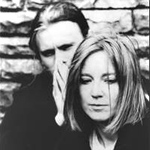
biography
Portishead were named after the sleepy
port on the south-west coast of England where Geoff Barrow (b. Weston-Super-Mare,
Avon, England) spent his teens. His intentions in forming the band were simple:
"I just wanted to make interesting music, proper songs with a proper life span
and a decent place in people's record collections." Barrow started out as a tape
operator, working in a minor capacity with Massive Attack and Neneh Cherry, and
also wrote songs for Cherry ("Somedays" was included on her 1992 collection,
Homebrew). With the aid of an Enterprise Allowance grant he recruited jazz
guitarist and musical director Adrian Utley, drummer/programmer Dave MacDonald
and vocalist Beth Gibbons (b. Keynsham, Bristol, Avon, England), whom he
encountered on a job creation scheme while she was singing Janis Joplin cover
versions in a pub. Together they recorded a soundtrack and film, To Kill A Dead
Man, with themselves as actors because "we couldn't find anyone else to do the
parts". At this point they came to the attention of A&R man Ferdy Unger-Hamilton
at the Go! Discs subsidiary, Go! Beat, who encouraged Barrow to remix
Gabrielle's "Dreams". He was sufficiently impressed with the results to sign the
band immediately, despite several other interested parties. The singles "Numb"
and "Sour Times" emerged to good press reaction, although the debut album
slipped in and out of the charts with little fanfare. There was some problem
with marketing the band - both Barrow and Gibbons were reluctant to do
interviews, and had no initial interest in playing live. Instead the press
campaign saw painted mannequin dummies distributed in strategic locations
throughout London, ensuring press coverage outside of the expected media.
Word of mouth continued to push the band's profile and, with virtually no radio
support, their third single, "Glory Box", entered the UK charts at number 13 in
January 1995. Aided by a distinctive, gender-swapping video (visuals are central
to the band's approach), its arrival came on the back of several Album Of The
Year awards for Dummy from magazines as diverse as Mixmag, ID, The Face and
Melody Maker. Mixing torch songs with blues, jazz and hip-hop, their sound
became known as "trip-hop". The interest also translated to America, where the
album sold over 150,000 copies without the band even setting foot there. They
were then awarded the Mercury Music Prize for best album of 1995. Following
their success, the band were invited to contribute to several soundtracks,
including two low-budget art movies and Tank Girl. The long-awaited follow-up to
Dummy was severely delayed when Barrow, a self-confessed perfectionist, reached
a creative impasse that almost destroyed the band. His perseverance paid off,
however, when Portishead was released in September 1997 to excellent critical
reviews, but ultimately disappointing sales. Although first single "All Mine"
had suggested some variation to the Portishead sound, the album covered
essentially the same ground as their debut, albeit in an impressively stylish
manner. A perfunctory live album followed in 1998.
discography
PNYC
Label: London
Released: 11.10.98
Portishead
Label: London
Released: 09.30.97
Dummy
Label: Go! Discs
Released: 10.18.94
links